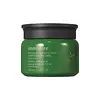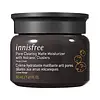What's inside
What's inside
 Key Ingredients
Key Ingredients

 Benefits
Benefits

 Concerns
Concerns

 Ingredients Side-by-side
Ingredients Side-by-side

Water
Skin ConditioningPropanediol
SolventGlycerin
HumectantMethyl Trimethicone
Skin ConditioningStearyl Dimethicone
EmollientButylene Glycol Dicaprylate/Dicaprate
EmollientPentaerythrityl Tetraethylhexanoate
EmollientCamellia Sinensis Seed Oil
HumectantPolymethylsilsesquioxane
Glyceryl Polymethacrylate
1,2-Hexanediol
Skin ConditioningOctadecene
SolventHydroxyethyl Acrylate/Sodium Acryloyldimethyl Taurate Copolymer
Emulsion StabilisingPolyglyceryl-3 Methylglucose Distearate
EmulsifyingGlyceryl Stearate
EmollientHydrogenated Lecithin
EmulsifyingCholesterol
EmollientCarbomer
Emulsion StabilisingParfum
MaskingTromethamine
BufferingCetearyl Alcohol
EmollientPanthenol
Skin ConditioningXanthan Gum
EmulsifyingGlyceryl Caprylate
EmollientSodium Stearoyl Glutamate
CleansingDisodium EDTA
Ethylhexylglycerin
Skin ConditioningSorbitan Isostearate
EmulsifyingCamellia Sinensis Leaf Extract
AntimicrobialSodium Hyaluronate
HumectantDextrin
AbsorbentTheobroma Cacao Extract
Skin ConditioningTocopherol
AntioxidantWater, Propanediol, Glycerin, Methyl Trimethicone, Stearyl Dimethicone, Butylene Glycol Dicaprylate/Dicaprate, Pentaerythrityl Tetraethylhexanoate, Camellia Sinensis Seed Oil, Polymethylsilsesquioxane, Glyceryl Polymethacrylate, 1,2-Hexanediol, Octadecene, Hydroxyethyl Acrylate/Sodium Acryloyldimethyl Taurate Copolymer, Polyglyceryl-3 Methylglucose Distearate, Glyceryl Stearate, Hydrogenated Lecithin, Cholesterol, Carbomer, Parfum, Tromethamine, Cetearyl Alcohol, Panthenol, Xanthan Gum, Glyceryl Caprylate, Sodium Stearoyl Glutamate, Disodium EDTA, Ethylhexylglycerin, Sorbitan Isostearate, Camellia Sinensis Leaf Extract, Sodium Hyaluronate, Dextrin, Theobroma Cacao Extract, Tocopherol
Water
Skin ConditioningButylene Glycol
HumectantPropanediol
SolventLimnanthes Alba Seed Oil
Skin ConditioningMethyl Trimethicone
Skin ConditioningHydrogenated Poly(C6-14 Olefin)
EmollientPolymethylsilsesquioxane
1,2-Hexanediol
Skin ConditioningDiphenylsiloxy Phenyl Trimethicone
Skin ConditioningC14-22 Alcohols
Emulsion StabilisingCI 77891
Cosmetic ColorantHydrogenated Lecithin
EmulsifyingHydroxypropyl Starch Phosphate
Cetyl Hydroxyethylcellulose
Emulsion StabilisingAmmonium Acryloyldimethyltaurate/Vp Copolymer
Hydroxyethyl Acrylate/Sodium Acryloyldimethyl Taurate Copolymer
Emulsion StabilisingGlyceryl Stearate
EmollientC12-20 Alkyl Glucoside
EmulsifyingGlyceryl Caprylate
EmollientDisodium EDTA
Ethylhexylglycerin
Skin ConditioningTromethamine
BufferingLactic Acid
BufferingSalicylic Acid
MaskingGluconolactone
Skin ConditioningSorbitan Isostearate
EmulsifyingHydrated Silica
AbrasiveVolcanic Ash
AbrasiveDisodium Phosphate
BufferingSilica Dimethyl Silylate
EmollientGlucose
HumectantSilica
AbrasiveLactic Acid/Glycolic Acid Copolymer
Skin ConditioningTocopherol
AntioxidantPolyquaternium-10
Water, Butylene Glycol, Propanediol, Limnanthes Alba Seed Oil, Methyl Trimethicone, Hydrogenated Poly(C6-14 Olefin), Polymethylsilsesquioxane, 1,2-Hexanediol, Diphenylsiloxy Phenyl Trimethicone, C14-22 Alcohols, CI 77891, Hydrogenated Lecithin, Hydroxypropyl Starch Phosphate, Cetyl Hydroxyethylcellulose, Ammonium Acryloyldimethyltaurate/Vp Copolymer, Hydroxyethyl Acrylate/Sodium Acryloyldimethyl Taurate Copolymer, Glyceryl Stearate, C12-20 Alkyl Glucoside, Glyceryl Caprylate, Disodium EDTA, Ethylhexylglycerin, Tromethamine, Lactic Acid, Salicylic Acid, Gluconolactone, Sorbitan Isostearate, Hydrated Silica, Volcanic Ash, Disodium Phosphate, Silica Dimethyl Silylate, Glucose, Silica, Lactic Acid/Glycolic Acid Copolymer, Tocopherol, Polyquaternium-10
 Reviews
Reviews

Ingredients Explained
These ingredients are found in both products.
Ingredients higher up in an ingredient list are typically present in a larger amount.
1,2-Hexanediol is a synthetic liquid and another multi-functional powerhouse.
It is a:
- Humectant, drawing moisture into the skin
- Emollient, helping to soften skin
- Solvent, dispersing and stabilizing formulas
- Preservative booster, enhancing the antimicrobial activity of other preservatives
Disodium EDTA plays a role in making products more stable by aiding other preservatives.
It is a chelating agent, meaning it neutralizes metal ions that may be found in a product.
Disodium EDTA is a salt of edetic acid and is found to be safe in cosmetic ingredients.
Learn more about Disodium EDTAEthylhexylglycerin (we can't pronounce this either) is commonly used as a preservative and skin softener. It is derived from glyceryl.
You might see Ethylhexylglycerin often paired with other preservatives such as phenoxyethanol. Ethylhexylglycerin has been found to increase the effectiveness of these other preservatives.
Glyceryl Caprylate comes from glycerin and caprylic acid, a fatty acid from coconut. It has emollient and emulsifier properties.
As an emollient, it helps hydrate your skin. Emollients work by creating a barrier on your skin to trap moisture in, helping to keep your skin soft and smooth.
On the other hand, emulsifiers prevent ingredients (such as oil and water) from separating.
Learn more about Glyceryl CaprylateGlyceryl Stearate is a mix of glycerin and stearic acid.
It is used to stabilize the mixing of water and oil ingredients. By preventing these ingredients from separating, it can help elongate shelf life. It can also help thicken the product's texture.
As an emollient, it helps soften skin and supports barrier-replenishing ingredients.
In cosmetics, Glyceryl Stearate is often made from vegetable oils or synthetically produced.
This ingredient may not be fungal-acne safe
Fun fact: The human body also creates Glyceryl Stearate naturally.
Learn more about Glyceryl StearateHydrogenated Lecithin is created from the hydrogenation of lecithin (a group of phospholipids). Hydrogenation is a chemical reaction between hydrogen and another element.
This ingredient is an emollient and emulsifier. As an emollient, it helps soften skin by trapping moisture within. As an emulsifier, it prevents oil and water ingredients from separating.
This is a synthetic polymer. It helps improve the texture of products by adding thickness and gel-like feel.
It is also an emulsifer, meaning it prevents ingredients such as oil and water from separating. It also helps evenly disperse other ingredients.
Methyl Trimethicone is a type of silicone. It is a solvent and emulsifier.
Solvents are used to keep ingredients together in a product. They can help dissolve ingredients to stable bases or help evenly distribute ingredients throughout the product.
Emulsifiers help stabilize a product. It does this by preventing certain ingredients from separating.
Methyl Trimethicone does not get absorbed into the skin.
Learn more about Methyl TrimethiconePolymethylsilsesquioxane is a silicone used as a film forming agent.
When applied to the skin, this ingredient creates an invisible film on the surface. This film still allows oxygen to pass through, but prevents moisture from escaping. This can help condition and hydrate the skin. It also leaves a silky feel when applied.
Polymethylsilsesquioxane has not been shown to clog pores. It has been deemed safe to use up to 55%, but most cosmetics use much less.
If you have concerns about using this ingredient, we recommend speaking with a professional.
Learn more about PolymethylsilsesquioxanePropanediol is an all-star ingredient. It softens, hydrates, and smooths the skin.
It’s often used to:
Propanediol is not likely to cause sensitivity and considered safe to use. It is derived from corn or petroleum with a clear color and no scent.
Learn more about PropanediolSorbitan Isostearate is an emulsifer and cleaning agent. It is created from isostearic acid and sorbitol.
As an emulsifier, Sorbitan Isostearate prevents oils and water from separating.
Due to its isostearic acid base, it may not be safe for Malassezia or fungal acne.
Learn more about Sorbitan IsostearateTocopherol (also known as Vitamin E) is a common antioxidant used to help protect the skin from free-radicals and strengthen the skin barrier. It's also fat soluble - this means our skin is great at absorbing it.
Vitamin E also helps keep your natural skin lipids healthy. Your lipid skin barrier naturally consists of lipids, ceramides, and fatty acids. Vitamin E offers extra protection for your skin’s lipid barrier, keeping your skin healthy and nourished.
Another benefit is a bit of UV protection. Vitamin E helps reduce the damage caused by UVB rays. (It should not replace your sunscreen). Combining it with Vitamin C can decrease sunburned cells and hyperpigmentation after UV exposure.
You might have noticed Vitamin E + C often paired together. This is because it is great at stabilizing Vitamin C. Using the two together helps increase the effectiveness of both ingredients.
There are often claims that Vitamin E can reduce/prevent scarring, but these claims haven't been confirmed by scientific research.
Learn more about TocopherolTromethamine helps balance the pH and improve the texture of a product. It is synthetically created.
As an emulsifier, Tromethamine prevents oil and water ingredients from separating. This helps stabilize the product and elongate a product's shelf life. Tromethamine also makes a product thicker.
Tromethamine helps balance the pH level of a product. Normal pH level of skin is slightly acidic (~4.75-5.5). The acidity of our skin is maintained by our glands and skin biome. Being slightly acidic allows our skin to create an "acid mantle". This acid mantle is a thin barrier that protects our skin from bacteria and contaminants.
Oral Tromethanmine is an anti-inflammatory drug but plays the role of masking, adding fragrance, and/or balancing pH in skincare.
1,3-Propanediol, 2-amino-2-(hydroxymethyl)-
Learn more about TromethamineWater. It's the most common cosmetic ingredient of all. You'll usually see it at the top of ingredient lists, meaning that it makes up the largest part of the product.
So why is it so popular? Water most often acts as a solvent - this means that it helps dissolve other ingredients into the formulation.
You'll also recognize water as that liquid we all need to stay alive. If you see this, drink a glass of water. Stay hydrated!
Learn more about Water